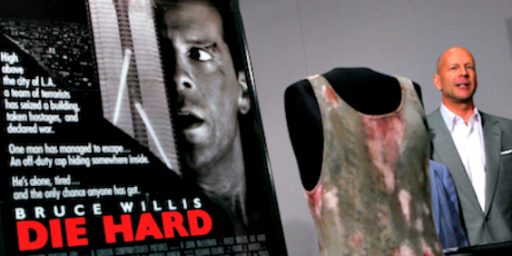CHARITY FOR NONE, MALICE TOWARD ALL
Matt Yglesias uses a rather bizarre piece in National Review to posit “Conservatism jumps the shark.”
But then I met Tiffany. Or, more precisely, Tiffany’s mother. And, after a ten-month crash course in why the poor are poor, I am squishy no more.
***
And so it is, that on the eve of the merriest of seasons, I have finally become a compassionless conservative, because of a deadbeat mother who bowls. I now stand in defense of Darwin and natural selection, and of Ebenezer Scrooge, the real Scrooge – before he went soft like me – Scrooge, at his noblest, the way he was before the onset of those pesky midnight visitors. I think of him fondly and recall his inspiring words: “Are there no prisons? Are there no poorhouses?”
It’s time to rethink old Scrooge. Ebenezer knew the truth: No good deed goes unpunished.
***
As a mother, I still worry about Tiffany and her brother, but, as a conservative, I know that as long as the neighborhood – the village – cared for them, her mother never would. Maybe, with the help of a jail and a poorhouse, the little family will get it together, discover the value of work. It’s a long shot, but, as the magnet on my refrigerator says, “Dreams come true at Christmas.”
One wonders what would possess NR, the bastion of Brahmin noblesse oblige, to publish such a thing? I haven’t read the magazine in years, but surely its editorial stance hasn’t shifted that far from the days when Bill Buckley was at the helm? NR has steadfastly opposed governmental handouts, not private charity.






Think you missed the point James.
“…I know that as long as the neighborhood – the village – cared for them, her mother never would….”
I got the point, but don’t buy the conclusion. I’m sure there are plenty of leeches out there who would gladly take advantage of people’s generosity and mooch of of society. Does that mean we should discontinue charity?
I think you, Matthew and a whole bunch of commenters missed the whole point to the story.
The mother was a metaphor. Or perhaps the word is an icon. She represents what is wrong with the whole welfare system.
The story is NOT about the mother. It is about the change in thought process of the author. Before she had the experience she labored under the misconception that the poor are not there because of the choices they make, but by happenstance.
The key line to the whole thing was: And, after a ten-month crash course in why the poor are poor, I am squishy no more.
She now “gets” that welfare hurts more than it helps.
If you will allow me to digress… I used to argue passionately with a female friend of mine who was a card carrying liberal. One night I ran into her and she had a Bush (41) bumper sticker on her car. I asked who the jokester was and she said it was her sticker that she was now more right wing than me.
Turns out when she came out of medical school she did a few rotations in the local “charity” hospital. She saw firsthand how the welfare system was the ruination of her patients. She went from liberal college student idealist to a staunch conservative in 2 eye opening weeks.
Our author had a similar experience.
Paul,
I started my excerpt with that quote. But she doesn’t draw the welfare state analogy. If that was her point, it was seriously buried in the piece.
You might find support for these kinds of beliefs in Spencer, but you won’t find them in, say, the Bible.
I’ll admit it might not be the best written piece on the planet but consider the subhead:
“Or, how I became a compassionless conservative.”
I think the story is more about her journey than this one person.
… or that is what I took it to be- and certainly that makes more sense in the scope of things.
—